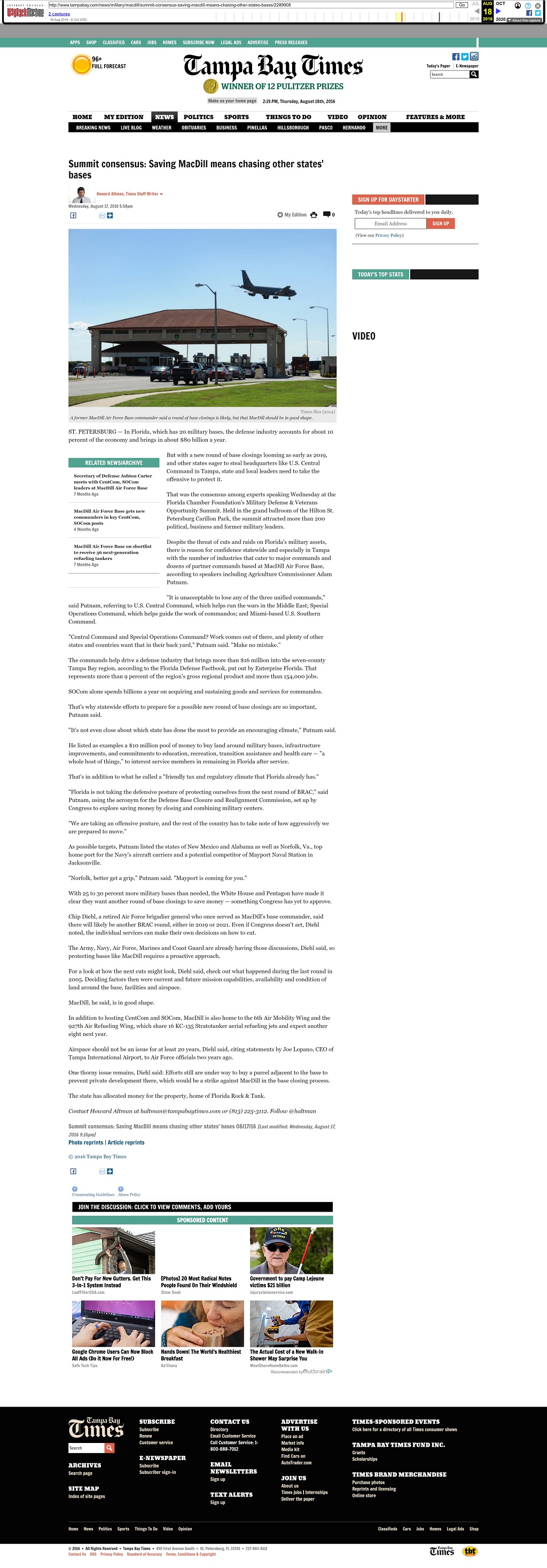
News / Military
By Howard Altman / Tampa Bay Times / August 17, 2016
PHOTO: A former MacDill Air Force Base commander said a round of base closings is likely, but that MacDill should be in good shape (Times files 2014)
ST. PETERSBURG — In Florida, which has 20 military bases, the defense industry accounts for about 10 percent of the economy and brings in about $80 billion a year.
But with a new round of base closings looming as early as 2019, and other states eager to steal headquarters like U.S. Central Command in Tampa, state and local leaders need to take the offensive to protect it.
That was the consensus among experts speaking Wednesday at the Florida Chamber Foundation’s Military Defense & Veterans Opportunity Summit. Held in the grand ballroom of the Hilton St. Petersburg Carillon Park, the summit attracted more than 200 political, business and former military leaders.
Despite the threat of cuts and raids on Florida’s military assets, there is reason for confidence statewide and especially in Tampa with the number of industries that cater to major commands and dozens of partner commands based at MacDill Air Force Base, according to speakers including Agriculture Commissioner Adam Putnam.
“It is unacceptable to lose any of the three unified commands,” said Putnam, referring to U.S. Central Command, which helps run the wars in the Middle East; Special Operations Command, which helps guide the work of commandos; and Miami-based U.S. Southern Command.
“Central Command and Special Operations Command? Work comes out of there, and plenty of other states and countries want that in their back yard,” Putnam said. “Make no mistake.”
The commands help drive a defense industry that brings more than $16 million into the seven-county Tampa Bay region, according to the Florida Defense Factbook, put out by Enterprise Florida. That represents more than 9 percent of the region’s gross regional product and more than 154,000 jobs.
SOCom alone spends billions a year on acquiring and sustaining goods and services for commandos.
That’s why statewide efforts to prepare for a possible new round of base closings are so important, Putnam said.
“It’s not even close about which state has done the most to provide an encouraging climate,” Putnam said.
He listed as examples a $10 million pool of money to buy land around military bases, infrastructure improvements, and commitments to education, recreation, transition assistance and health care — “a whole host of things,” to interest service members in remaining in Florida after service.
That’s in addition to what he called a “friendly tax and regulatory climate that Florida already has.”
“Florida is not taking the defensive posture of protecting ourselves from the next round of BRAC,” said Putnam, using the acronym for the Defense Base Closure and Realignment Commission, set up by Congress to explore saving money by closing and combining military centers.
“We are taking an offensive posture, and the rest of the country has to take note of how aggressively we are prepared to move.”
As possible targets, Putnam listed the states of New Mexico and Alabama as well as Norfolk, Va., top home port for the Navy’s aircraft carriers and a potential competitor of Mayport Naval Station in Jacksonville.
“Norfolk, better get a grip,” Putnam said. “Mayport is coming for you.”
With 25 to 30 percent more military bases than needed, the White House and Pentagon have made it clear they want another round of base closings to save money — something Congress has yet to approve.
Chip Diehl, a retired Air Force brigadier general who once served as MacDill’s base commander, said there will likely be another BRAC round, either in 2019 or 2021. Even if Congress doesn’t act, Diehl noted, the individual services can make their own decisions on how to cut.
The Army, Navy, Air Force, Marines and Coast Guard are already having those discussions, Diehl said, so protecting bases like MacDill requires a proactive approach.
For a look at how the next cuts might look, Diehl said, check out what happened during the last round in 2005. Deciding factors then were current and future mission capabilities, availability and condition of land around the base, facilities and airspace.
MacDill, he said, is in good shape.
In addition to hosting CentCom and SOCom, MacDill is also home to the 6th Air Mobility Wing and the 927th Air Refueling Wing, which share 16 KC-135 Stratotanker aerial refueling jets and expect another eight next year.
Airspace should not be an issue for at least 20 years, Diehl said, citing statements by Joe Lopano, CEO of Tampa International Airport, to Air Force officials two years ago.
One thorny issue remains, Diehl said: Efforts still are under way to buy a parcel adjacent to the base to prevent private development there, which would be a strike against MacDill in the base closing process.
The state has allocated money for the property, home of Florida Rock & Tank.
Wayback image

